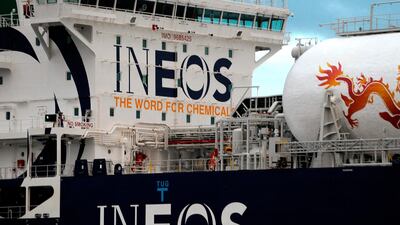BP is selling its global petrochemicals business to Ineos, owned by British billionaire Jim Ratcliffe, for a total of $5 billion (Dh18.3bn) as the company transitions to low carbon energy.
The oil major will sell its aromatics and acetyls interests, which have a strong presence in the Asian markets with an annual production of 9.7 million tonnes of petrochemicals.
Ineos, which previously acquired BP's chemicals subsidiary Innovene in 2005, will pay the company a deposit of $400 million and $3.6bn upon completion of the deal. An additional $1bn will be paid in three separate instalments of $100m in March, April and May 2021, with the remaining $700m payable by the end of June 2021, the company said.
The transaction is expected to complete by the end of this year.
"I recognise this decision will come as a surprise and we will do our best to minimise uncertainty," said BP chief executive Bernard Looney.
"Strategically, the overlap with the rest of BP is limited and it would take considerable capital for us to grow these businesses. As we work to build a more focused, more integrated BP, we have other opportunities that are more aligned with our future direction. Today's agreement is another deliberate step in building a BP that can compete and succeed through the energy transition,” he added.
Mr Looney, who replaced Bob Dudley as chief executive earlier this year, is pushing for a leaner, more green operating model at BP.
The oil major has vowed to become net carbon neutral by 2050, prompted by the growing discourse against fossil fuels and climate change. Earlier this month, BP wrote off $17.5bn from the value of its oil and gas business as it lowered its oil price expectations through to 2050.
The company said the coronavirus pandemic accelerated the transformation of the global economy to one based on lower carbon intensity. BP has divested $15bn worth of assets throughout 2019 and 2020, a target previously thought reachable only by mid-2021.
“While most of the oil majors and NOCs [national oil companies] are focusing on strengthening their petrochemical integration, BP has divested the last of its standalone petrochemical assets,” Steve Jenkins, vice president of Wood Mackenzie’s petrochemicals team, said.
“This ends a slow exit from the sector that began in 2005."
The move to divest from petchems “makes strategic sense” for BP as the business was struggling with over capacity, with the major requiring urgent funding, the consultancy said.
With the acquisition of BP’s petrochemicals business, Ineos will have access to a diverse base of manufacturing plants in the US, the UK, China, South Korea, Taiwan and Malaysia. The sale will also include related interests such as BP’s refining technology Infinia as well as the company’s interest in acetylated wood developer Tricoya.
More than 1,700 people are employed in the businesses being transferred to Ineos.
BP's deal with Ineos was "another step" in Mr Looney's reshaping of the business, said David Elmes, who heads the global energy research network at Warwick Business School.
"Oil market commentators have suggested the decreasing demand for oil as electric vehicle numbers rise would be replaced by increasing oil use for plastics and petrochemicals. Today’s sale by BP means the company is spinning off what they have left of their downstream market," Mr Elmes said.


